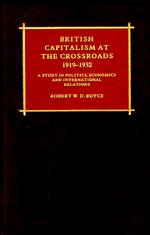 British Capitalism at the Crossroads, 1919–1932
British Capitalism at the Crossroads, 1919–1932 Book contents
- Frontmatter
- Contents
- Preface
- List of abbreviations
- Introduction
- 1 THE POLITICS OF ECONOMIC INTERNATIONALISM
- 2 CRUCIFIED ON A CROSS OF GOLD
- 3 ‘NORMALCY’
- 4 CONFLICT OVER COMMERCE
- 5 THE SCRAMBLE FOR GOLD
- 6 THE SECOND LABOUR GOVERNMENT AT THE HAGUE
- 7 FREE TRADE: THE LAST OFFENSIVE
- 8 THE CHALLENGE OF REGIONALISM
- 9 THE GOLD STANDARD UNDERMINED
- 10 THE AUSTRO-GERMAN CUSTOMS UNION CRISIS
- 11 THE COLLAPSE OF ECONOMIC INTERNATIONALISM
- Conclusion
- Notes
- Bibliography
- Index
2 - CRUCIFIED ON A CROSS OF GOLD
Published online by Cambridge University Press: 05 November 2011
- Frontmatter
- Contents
- Preface
- List of abbreviations
- Introduction
- 1 THE POLITICS OF ECONOMIC INTERNATIONALISM
- 2 CRUCIFIED ON A CROSS OF GOLD
- 3 ‘NORMALCY’
- 4 CONFLICT OVER COMMERCE
- 5 THE SCRAMBLE FOR GOLD
- 6 THE SECOND LABOUR GOVERNMENT AT THE HAGUE
- 7 FREE TRADE: THE LAST OFFENSIVE
- 8 THE CHALLENGE OF REGIONALISM
- 9 THE GOLD STANDARD UNDERMINED
- 10 THE AUSTRO-GERMAN CUSTOMS UNION CRISIS
- 11 THE COLLAPSE OF ECONOMIC INTERNATIONALISM
- Conclusion
- Notes
- Bibliography
- Index
Summary
The economic consequences of the peace
The British delegation that Lloyd George led to the Paris peace conference in January 1919 had definite views on many issues but no very clear strategy to guide them. Lloyd George consistently fought against the extreme proposals advanced by the French delegation for severing the Rhineland from Germany and favouring the newly independent Poland with territory largely occupied by Germans. Yet during the recent general election he himself had encouraged expectations of massive compensation from Germany, and he allowed British representation on the conference committee on reparations to go to men who were known to hold extreme views. Reparations were initially intended to cover damage to civilian property directly in the path of war, but as this meant that France would receive the lion's share, British delegates insisted upon an extension of liability to include widows' and disability pensions, which meant a massive increase in claims. Lloyd George now sought to postpone a final settlement until passions had subsided, and seized upon a French proposal to avoid mention of a specific figure in the peace treaty; instead an Inter-Allied Reparation Commission would have until 1 May 1921 to prepare a definitive schedule of payments. This, however, created a very unsatisfactory situation. The French were encouraged to hold firm in their demands, which so annoyed the American President, Woodrow Wilson, that he threatened to quit the conference.
- Type
- Chapter
- Information
- British Capitalism at the Crossroads, 1919–1932A Study in Politics, Economics, and International Relations, pp. 35 - 78Publisher: Cambridge University PressPrint publication year: 1988


